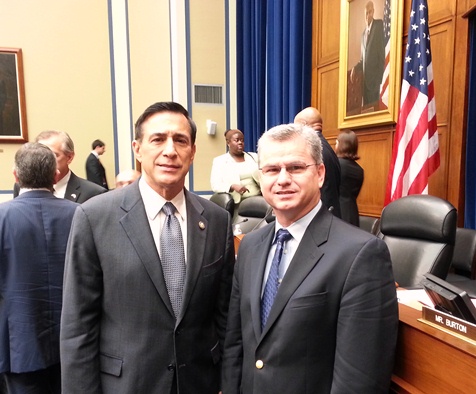
Agricultural News
Ag Retailers Chairman Testifies Before House Committee on the Impact of EPA's Regulatory Overreach
Fri, 20 Jul 2012 09:41:09 CDT

Many agricultural retailers feel the impact and expense of unnecessary and burdensome regulations on a daily basis. A growing number of these regulations are the result of recent actions taken by EPA. Today, Agricultural Retailers Association Chairman Billy Pirkle addressed several of these regulations and their negative impact on the U.S. agriculture industry and economy at a hearing before the House Committee on Oversight and Government Reform. Pirkle also serves as the Senior Director for Environmental, Health and Safety for Crop Production Services (CPS).
To begin his testimony, Pirkle explained the important role agricultural retailers play in the production of crops needed to feed the nation and the rest of the world. He explained the variety of crop inputs retailers provide to their farmer customers and the additional services and consultation they offer to help farmers make the most environmentally friendly choices on their operations.
One of the first issues Pirkle raised before the House Committee was EPA's decision to counteract a longstanding regulatory exemption for agricultural retailers and support the decision of the agency's Region 4 office (covering the Southeast United States) when they began issuing citations to agricultural retail facilities for failure to report under the Emergency Planning and Community Right-to-Know Act (EPCRA) when fertilizer was blended at the retail facility. The EPCRA statute actually applies to those who manufacture fertilizer and specifically exempts "fertilizer held for sale by a retailer to the ultimate consumer." However, now EPA stated that custom blending of fertilizer was the same as manufacturing fertilizer.
"Nearly all agricultural retailers custom blend types of fertilizer at the retail site for farmer customers because farmers do not have the equipment to blend in the field. Furthermore, blending fertilizer is a different process than manufacturing fertilizer," explained Pirkle in his testimony. "In 1987, EPA concluded that Congress's intent with EPCRA was to exempt a retail facility from these provisions because the general public was already aware of the retail sale and application of fertilizers."
Later, Pirkle also explained that if a retailer had to meet all EPCRA reporting requirements, their permitting requirements under other environmental laws could also change. Trying to comply with all these requirements could cost a retailer an additional $30,000 per year, plus a $6,000 annual update.
Another key issue Pirkle addressed in his testimony was the requirement that pesticide applicators obtain a National Pollutant Discharge Elimination System (NPDES) Clean Water Act (CWA) permit to conduct any pesticide applications. Pirkle explained that this is unnecessary since pesticides are already evaluated thoroughly by EPA under the Federal Insecticide, Fungicide and Rodenticide Act (FIFRA). The pesticide label, which includes use instructions for different crops, geographic regions and weather conditions, is approved by EPA, and the instructions are based on mountains of health and environmental data.
"A new NPDES permitting system would result in little to no environmental benefit, but could cost the industry millions of dollars to comply with these new requirements and leave commercial applicators and their farmer customers vulnerable to citizen suits," stated Pirkle. "Legislation has been introduced called the 'Reducing Regulatory Burdens Act' (H.R. 872) that would exempt FIFRA-compliant pesticide applications from CWA permitting requirements."
The Reducing Regulatory Burdens Act is currently part of the House version of the Farm Bill. Pirkle explained to the Committee that it is critical for the House to take action on the 2012 Farm Bill prior to the upcoming August recess to allow time to complete negotiations with the Senate on a final conference agreement.
In Pirkle's role at CPS, he works with his company's staff and management to give direction for the regulatory support and oversight of regulatory programs for all of the company's retail operations. His first-hand experience and regulatory knowledge made his testimony to the House Committee extremely valuable.
Other examples of EPA's Regulatory Overreach that Pirkle mentioned in his testimony included the following key issues under the Clean Water Act and Clean Air Act.
Clean Water Act (CWA) Issues
· EPA's proposed spray drift guidance document that changes the legal standard found in FIFRA to an essentially zero-tolerance spray drift standard.
· EPA's proposed guidance document to expand jurisdiction of the CWA without obtaining the necessary statutory changes or going through the formal rulemaking process.
· Numeric Nutrient Criteria regulations in Florida, Mississippi River Basin and the Chesapeake Bay
Clean Air Act (CAA) Issues
· Dust regulation in the agriculture industry
· Greenhouse Gas Regulations and the increased compliance costs to the suppliers of agricultural retailers, which would be passed along to the retailer and farmer.
In conclusion, Pirkle spoke on behalf of agricultural retailers asking Congress to hold regular oversight hearings regarding federal agency regulatory and enforcement activities. He also requested that Congress take necessary legislative action to prevent EPA from over-reaching its statutory authorities in the areas highlighted in his testimony.
ARA and its member companies are strong stewards of the environment and continue to operate in an environmentally safe manner. ARA welcomes the opportunity to continue to work with the Committee, Congress and EPA to provide any needed statutory clarifications to improve regulations.
Video of Pirkle's verbal testimony before the House committee is available here. Pirkle begins speaking at about 49:20 in the video. Click here to read Pirkle's complete written testimony.
WebReadyTM Powered by WireReady® NSI
Top Agricultural News
More Headlines...




















